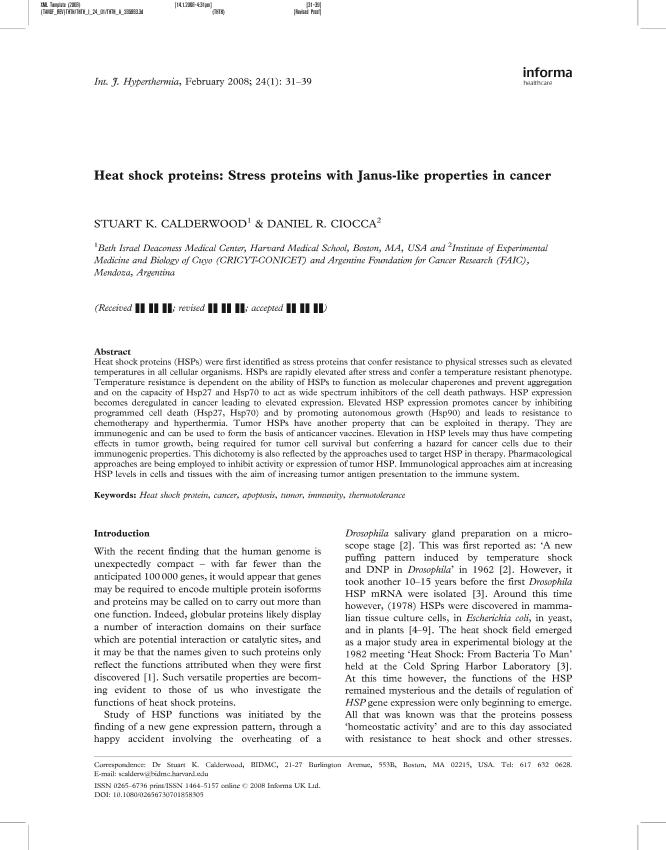Mostrar el registro sencillo del ítem
dc.contributor.author
Calderwood, Stuart K.
dc.contributor.author
Ciocca, Daniel Ramon

dc.date.available
2019-07-26T16:44:25Z
dc.date.issued
2008-02
dc.identifier.citation
Calderwood, Stuart K.; Ciocca, Daniel Ramon; Heat shock proteins: Stress proteins with Janus-like properties in cancer; Taylor & Francis; International Journal Of Hyperthermia; 24; 1; 2-2008; 31-39
dc.identifier.issn
0265-6736
dc.identifier.uri
http://hdl.handle.net/11336/80389
dc.description.abstract
Heat shock proteins (HSPs) were first identified as stress proteins that confer resistance to physical stresses such as elevated temperatures in all cellular organisms. HSPs are rapidly elevated after stress and confer a temperature resistant phenotype. Temperature resistance is dependent on the ability of HSPs to function as molecular chaperones and prevent aggregation and on the capacity of Hsp27 and Hsp70 to act as wide spectrum inhibitors of the cell death pathways. HSP expression becomes deregulated in cancer leading to elevated expression. Elevated HSP expression promotes cancer by inhibiting programmed cell death (Hsp27, Hsp70) and by promoting autonomous growth (Hsp90) and leads to resistance to chemotherapy and hyperthermia. Tumor HSPs have another property that can be exploited in therapy. They are immunogenic and can be used to form the basis of anticancer vaccines. Elevation in HSP levels may thus have competing effects in tumor growth, being required for tumor cell survival but conferring a hazard for cancer cells due to their immunogenic properties. This dichotomy is also reflected by the approaches used to target HSP in therapy. Pharmacological approaches are being employed to inhibit activity or expression of tumor HSP. Immunological approaches aim at increasing HSP levels in cells and tissues with the aim of increasing tumor antigen presentation to the immune system.
dc.format
application/pdf
dc.language.iso
eng
dc.publisher
Taylor & Francis

dc.rights
info:eu-repo/semantics/openAccess
dc.rights.uri
https://creativecommons.org/licenses/by-nc-sa/2.5/ar/
dc.subject
Apoptosis
dc.subject
Cancer
dc.subject
Heat Shock Protein
dc.subject
Immunity
dc.subject
Thermotolerance
dc.subject
Tumor
dc.subject.classification
Medicina Critica y de Emergencia

dc.subject.classification
Medicina Clínica

dc.subject.classification
CIENCIAS MÉDICAS Y DE LA SALUD

dc.title
Heat shock proteins: Stress proteins with Janus-like properties in cancer
dc.type
info:eu-repo/semantics/article
dc.type
info:ar-repo/semantics/artículo
dc.type
info:eu-repo/semantics/publishedVersion
dc.date.updated
2019-06-10T21:23:33Z
dc.journal.volume
24
dc.journal.number
1
dc.journal.pagination
31-39
dc.journal.pais
Reino Unido

dc.journal.ciudad
London
dc.description.fil
Fil: Calderwood, Stuart K.. Harvard Medical School; Estados Unidos
dc.description.fil
Fil: Ciocca, Daniel Ramon. Consejo Nacional de Investigaciones Científicas y Técnicas. Centro Científico Tecnológico Conicet - Mendoza. Instituto de Medicina y Biología Experimental de Cuyo; Argentina. Fundación Argentina para la Investigación del Cáncer; Argentina
dc.journal.title
International Journal Of Hyperthermia

dc.relation.alternativeid
info:eu-repo/semantics/altIdentifier/doi/http://dx.doi.org/10.1080/02656730701858305
dc.relation.alternativeid
info:eu-repo/semantics/altIdentifier/url/https://www.tandfonline.com/doi/full/10.1080/02656730701858305
Archivos asociados
